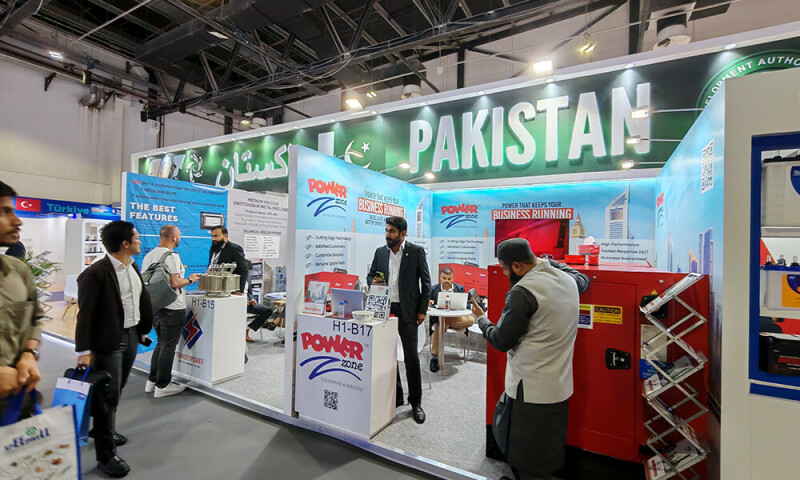DUBAI: Renewable energy solutions were front and centre for a small group of Pakistani exhibitors who were among 1,600 global companies present at Middle East Energy (MME) 2025, held at the Dubai World Trade Centre, where clean mobility and smart technologies were on display.
Energy experts from Pakistan believe renewable and sustainable solutions are the way forward.
“This is the need of the time,” said Babar Shahzad, director of Shahzad Pumps, adding that in many countries, especially in Africa, the energy crisis is at a peak.
Dubai’s inclusion in Global Power City Index a ‘clear signal for Pakistani investors’
That’s where Shahzad Pumps’ solar-powered, submersible pumps come in.
“They use solar power or we can use battery backup,” he said, talking to Business Recorder at the 49th Middle East Energy exhibition, held from April 7 to 9. “The special thing in these pumps is that they do not need any converter or any inverter in between these pumps and solar panels.”
The move to solar panels was inevitable, Shahzad noted, especially with steep and frequent price increases in common energy sources: electricity and gasoline.
“That’s why they are switching towards renewable energy,” he said, talking about his clients in Pakistan, Africa, Middle East, and Iran.
Shahzad Pumps, which has a head office in Faisalabad, has stayed competitive for almost five decades by adapting and changing with the times.
“If we don’t make new technological advancement, don’t introduce new technological items to our local market and to the international market, we could not survive,” he noted.
Trade events like MME provide crucial learning opportunities that help companies advance their research and development.
Creating an impact
“The exposure that this exhibition provides is not just about creating sales,” said Ali Shahzad, Manager Business Development, Fast Cables. “It’s about creating a bigger impact.”
Companies that mean business pay attention to what their clients tell them, he said.
“You are willing to understand the pain points of the audience,” said Ali Shahzad.
Fast Cables, as the name indicates, mainly produces power cables, but has recently stepped into the realm of LED lighting after seeing a gap in the local market.
“There was no local player who could provide good value for money in this particular sector, so we decided to venture into it,” said Ali Shahzad.
“We come up with the solution where we give the same specifications, or the same experience as any mega brand would give you, but at a considerably low price,” he added.
The product was initially launched in Pakistan, where a favourable response encouraged Fast Cables to take their LED products to countries abroad.
Besides client pain points, exposure to a large industry gathering like Dubai’s MME also highlights the gaps companies can face locally.
International competition
A closer look at their competition tells Jawad Khalid, Manager Business Development – Export, PEL, exactly what obstacles at home puts his company in a disadvantageous position.
“We see that other governments provide a lot of rebates on export,” he noted. “Their [business] procedure is very easy, whereas when we compare ourselves with them, we have duties on export, we have our issues with the banking channels. We cannot really bring in dollars without scrutiny.”
Despite all that, much like Fast Cables, PEL is also focusing on expanding its global reach.
“Previously, we were exporting our transformers to the African market and the Middle Eastern market, but now we have also entered the US market,” said Khalid. “We are now frequently exporting our transformers to the US.”
However, international trade turbulence due to tariffs imposed by US president Donald Trump has instilled hesitation in some customers, he said.
“Right now, to be really honest, some of our orders have been put on hold,” noted Khalid. “Unfortunately, like all other companies and all other countries, we are getting hit by that tariff.”
Like the rest of the world, he said, PEL is also curious to see how global trade will evolve in the coming days.
“The duties that are being implemented on China, that’s not a problem, because they are much higher than what has been implemented on Pakistan,” said Khalid.
But some competitors, like Turkey are at a slight advantage despite also facing tariffs.
“Turkey only has a tariff of 10 per cent now, so it will put us at a very disadvantageous position when compared to Turkey,” noted Khalid.
However, PEL, an already well-known Pakistani brand, continues to increase its competitiveness by achieving more international manufacturing standardizations.
“Previously, we were manufacturing transformers on IEC standards, but the USA required IEEE standards,” said Khalid. “Now we are manufacturing as per IEEE standard. In addition to that, there is a requirement of UL (Underwriters Laboratories) certification in the US market, so now we are in the process of getting ourselves approved for that as well.”
Another well-known Pakistani brand, Osaka Batteries, a division of ACM Group of Industries, is also working to strengthen its grip in the renewable energy field by producing lead acid and graphene EV batteries for motor bikes.
E-bikes may not be as much in demand in Pakistan right now, but the UAE is a ripe market, due to the various delivery companies operating in the country.
Osaka was a good fit for this year’s MEE, which also debuted The Battery Show Middle East and The Battery Show Conference, held under the patronage of the UAE Ministry of Energy and Infrastructure at World Trade Centre in Dubai.
Osaka is furthering its sustainability ambitions by venturing into recycling lead in Pakistan while also trying to build a lithium-ion battery plant in Pakistan.
Supported by the UAE Ministry of Energy and Infrastructure, more than 150 energy leaders and experts at MME explored transformative sector innovations, global energy market dynamics, and how AI is helping enable a sustainable, affordable energy future.
Copyright Business Recorder, 2025


